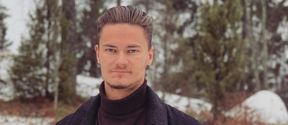Communications Engineering, Master of Science (Technology)
In our digitally revolutionised world, the ability to develop, build, and maintain networks is in greater demand than ever before.

Bhavya Omkarappa came across with Communications Engineering study option when she started look for universities in Europe that would have master´s programmes with both the technical and business aspects. She has been happy with her choice and thinks that when studying in this master´s degree, being proactive and engaging with people is really important.
Bhavya moved to Finland from India, and it always takes time to adapt to a new country and culture, but luckily she has been comfortable with her job, as well as the Finnish society and culture. After graduation, she plans to stay in Finland.
I did my bachelor’s degree in electronics and communications in India, and after that, I was working for three years. While I was working, I realised I wanted to get a deeper understanding of telecommunications so I started to look for universities in Europe that would have programmes with both the technical and business aspects of what I was after. I came across with Master's Programme in Computer, Communication and Information Sciences - Communications Engineering, and decided to apply to Aalto University even though I didn’t have much time to prepare; I didn’t get in, but I was convinced that this was the right programme for me, so I applied the following year and was accepted.
Apart from getting technical and practical knowledge from the courses, I think working in Professor Heikki Hämmäinen’s research group has been the best part of my studies. He has truly challenged me to be the best with my research. In 2017, I got an opportunity to present my preliminary research thesis results in an international telecommunications conference in Denmark and in 2018, I presented my thesis results at the European Regional International Telecommunication Society Conference in Italy. It was one of the lifetime experiences to present my research in front of such a big, global audience not only from academics but also from regulatory and consultants in this field.
Alongside the courses from my track, I also took product development and global innovation courses. These courses have very good collaboration with other universities in the world and gave me an opportunity to visit Stanford University. It was a very inspiring experience!
The master’s programme definitely brushed up my technical skills and I also gained knowledge on the economics of the telecom industry. The courses were just not theoretical, for example we did an interesting business simulation game in the course called Operator Business. It provided a holistic view on management challenges, enterprise functions, and their interdependencies. We got an opportunity to practice managerial analysis, planning and decision-making skills in a simulated virtual mobile market.
Bhavya OmkarappaThis job is exactly what I was looking for; it’s related to the world of business, but with the technical aspect.
I am working for Ericsson as an Integration Engineer where I work mostly on data analytics and the digital business solutions that Ericsson offers to the mobile operators in Finland. My main tasks are integrating these solutions into the operator’s network and solving any service requests or customisations the customers would like to have. This job is exactly what I was looking for; it’s related to the world of business, but with the technical aspect.
Finland is a small gem in the world, where everything works exactly as it supposed to be, so I think I will be here for a while. The telecommunications market works differently in Finland than in India, and it brings challenge to my work. Integrating to the culture will, of course, take a lot of time especially with the language, but I have been very comfortable with my job, the society and culture. People are very polite and straightforward.
While I was finishing my thesis results, I came across the open position at Ericsson, and decided to apply. A few days later, I got a call for an interview and it was one of the most interesting interviews I have ever had. I started as an intern, but moved on to a full-time position.
Because this is one of the top-quality researches in Aalto, studying in this course is all about making use of this opportunity. My personal experience is that in the master’s programme, there are so many things you can learn and so many relevant resources and opportunities. Make use of it by being proactive and engaging with the people and professors.
Another very important thing is to practice time-efficiency. It is one of the most important things I’ve learned because there is so much happening on the campus, and it’s good to find a balance between your student life and your studies.
To international students who are wondering whether they would have the courage to come to study in Finland, I would say to give it a try. You can never know whether you like it or not before you try it.
Would you like to hear more about studying, applying and student life at Aalto University? Sign-up for our newsletter!
You can find more information about the programme here.

In our digitally revolutionised world, the ability to develop, build, and maintain networks is in greater demand than ever before.

Niki Aarnio has especially liked the internationality and concrete nature of his studies

Electricity is everywhere, and our society would not function without it. As a student at the School of Electrical Engineering, you can find solutions to issues related to sustainable development and human well-being.

From here you can learn everything from immigration formalities to useful links for settling into life in Finland and at Aalto University.


